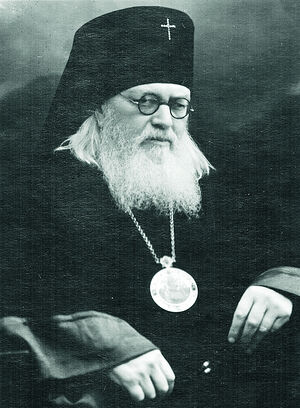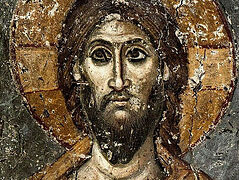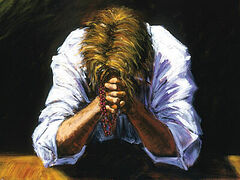 St. Luke (Voino-Yasenetsky), Archbishop of Crimea. Photo: ruskline.ru Having fasted bodily, brothers, let us also fast spiritually. Let us look into these words, for they explain the aim and importance of the fast.
St. Luke (Voino-Yasenetsky), Archbishop of Crimea. Photo: ruskline.ru Having fasted bodily, brothers, let us also fast spiritually. Let us look into these words, for they explain the aim and importance of the fast.
Why have the fasts been instituted? In order to accustom us to restraint. To what restraint? In the direct sense, to restraint from satiating and tasty foods. However, this is not the full extent of fasting—this is only bodily fasting, but it should be the school of spiritual fasting. What is spiritual fasting? It is restraint from everything that is harmful to us, from everything that corrupts our soul—that is, from the passions that lie at the foundation of all our sins. The holy fathers discerned eight main passions: gluttony, fornication, love of money, anger, grief, despondency, ambition, and pride. Why is gluttony listed first? Because whoever does not conquer this lowest, animal passion cannot conquer all the other passions.
The holy fathers, who deeply searched all that went on in their own hearts and studied the paths by which sin takes hold in the human heart, taught that all these passions are linked with each other in a direct succession; that is, if you don’t conquer a passion of a lower order, another more sophisticated passion is born in the heart. And these two in turn evoke a third, and so on. This unbroken interconnection of the passions can be compared to a heavy chain that strongly entangles us, and in order to untangle it we have to begin not from the center, or from the end, but from the beginning. Fasting is instituted precisely because gluttony is the beginning of this chain, and the original basis for all our other passions.
If a person always eats to satiety, is always too full, ever gorging himself with tasty and sweet foods—especially if he drinks a lot of wine—then this gluttony leads him into fornication. And fornication is a very base passion, so vile that it should not be named among Christians, as the apostle Paul said in his Epistle to the Ephesians (cf. Eph. 5:3).
But what happens if a glutton falls into fornication? He will need money to keep his lovers, moreover, big money. His soul will burn with the longing to acquire more and more earthly goods in order to attract depraved women. In other words, he will become possessed with the passion of the love of money. As the apostle Paul wrote in his Epistle to Timothy, love of money is the root of all evil (1 Tim. 6:10).
But if a person with a satiated stomach, who lives a life of fornication, makes it his goal to acquire wealth, then he will inevitably fall into the passion of anger. He will become irritable, angry, cursing and swearing, hating anyone who prevents him from reaching his base goals.
But often in order to stop such a man on his sinful path, the Lord sends serious illnesses or ruin, forcing him to experience profound humiliation or the death of close ones. And then the next passion comes into its own: grief. Grief is an extreme falling of spirit that follows any crushing event in life. And if a person in his grief does not remember love, good deeds, and God, then he will inevitably also fall into the next passion: despondency.
Despondency leaves a heavy mark on the soul. Nothing interests that person any longer; it seems to him that he is laboring in vain, and he gives up, stops praying, and leaves the Church. Deep despondency often even leads to suicide.
We can see that all these passions are linked with our flesh, with its lusts, and have their roots in the first and main passion—gluttony. Two passions remain, which are the most destructive and terrible, and are no longer directly linked to the fleshly lusts, but possess the hearts and souls even of great ascetics if they start to think that they have already reached the heights of the virtues and sanctity. This is vanity, and pride that follows after it. Even if a person has virtues, he should not think that he has earned them by his own labors, but rather he should see God’s grace in them.
But what can we say about ascetics? The passion of vainglory is infinitely multi-faceted. We are vainglorious about everything—some about their physical beauty, riches and luxurious clothing, grandiose houses, or physical strength; others are vainglorious about their deep intellect, all-around education, and talents. The vainglorious person inevitably becomes proud—he looks down on everyone as insignificant, as knowing nothing, and worthless.
Meanwhile the wretch himself does not see that he is possessed by the mortal sin of pride, the most terrible of all passions, for it is the spiritual essence of the devil and hateful to God. Every proud person is abominable to the Lord. At the reading of the Epistle of the apostle James you have heard many times that God resists the proud, but gives grace to the humble (Jas. 4:6). The proud person can never please God, even if he spends his whole life in ascetic labors. That is how destructive the passion of pride is.
Close your eyes, lower your head, and direct the gaze of your mind to your heart, and search which passion, which snakes are nesting there. Find all of them, and only then make bold to approach confession. Hide nothing.
The fast is before you, the time of repentance and salvation. Many people do not understand the importance of the fasts and do not observe them. But it is bodily fasting that helps us repent and be saved; because, as we have already seen, gluttony is the mother of all the other passions, but it is also the simplest one to overcome. If we fulfill this easy commandment, which is not beyond our strength—if we bridle our stomach—then we will also receive power over the more complicated passions.
In order to overcome all the passions without exception, it is necessary to learn abstinence. Without bodily fasting, this is impossible to achieve. Just as in school, students are gradually led from the lower courses of knowledge to the higher, from the alphabet to higher mathematics, so also must temperance begin with the alphabet, with bridling our stomachs.
This is why fasting is so important. But many do not understand this and neither observe the fasts themselves, nor teach their children to observe them. And not only do they not teach them—even during Passion Week, mothers feed their children meat, saying, “Eat, eat, children! No matter that it’s Lent. God sees that we always eat poorly. God will forgive, God will not hold us accountable for it…”
Oh, yes, He will hold you accountable if you corrupt your children! Every mother should accustom her children to fasting from an early age, as it was in the old days, when our people kept the fasts.
Do not underestimate the significance of fasting—accustom your children to fasting from the earliest age, and pay no attention to the mockery of blasphemers. Let them laugh as they sink into their own lusts, but you bless God, Who teaches you through His Church to war with the passions. Follow the commands of the Church in everything, for she is your mother, who is kind, pure, holy, and teaches you only what is salvific. Do not forget about fasting, but hold to all the Church’s statutes with all your might, like a child holds on to the hem of his mother’s dress. And the Lord will lead you to the place of your heart’s yearning, to the kingdom of light, the kingdom of grace. Amen.




